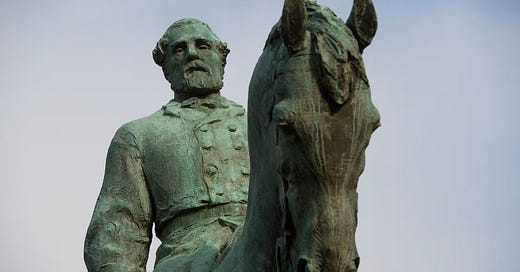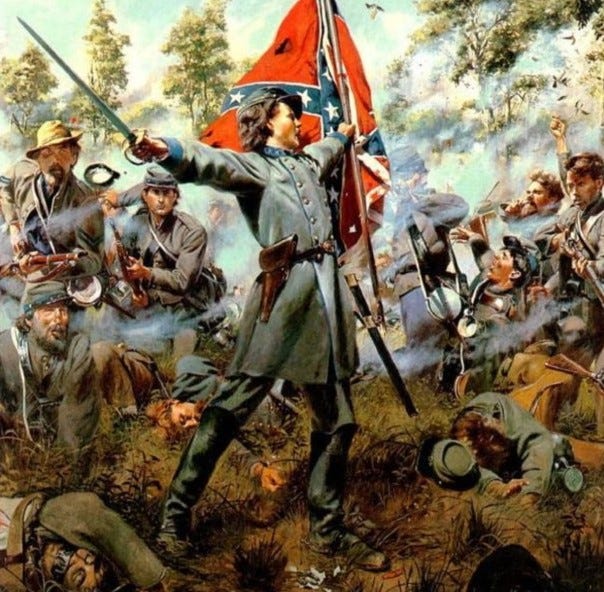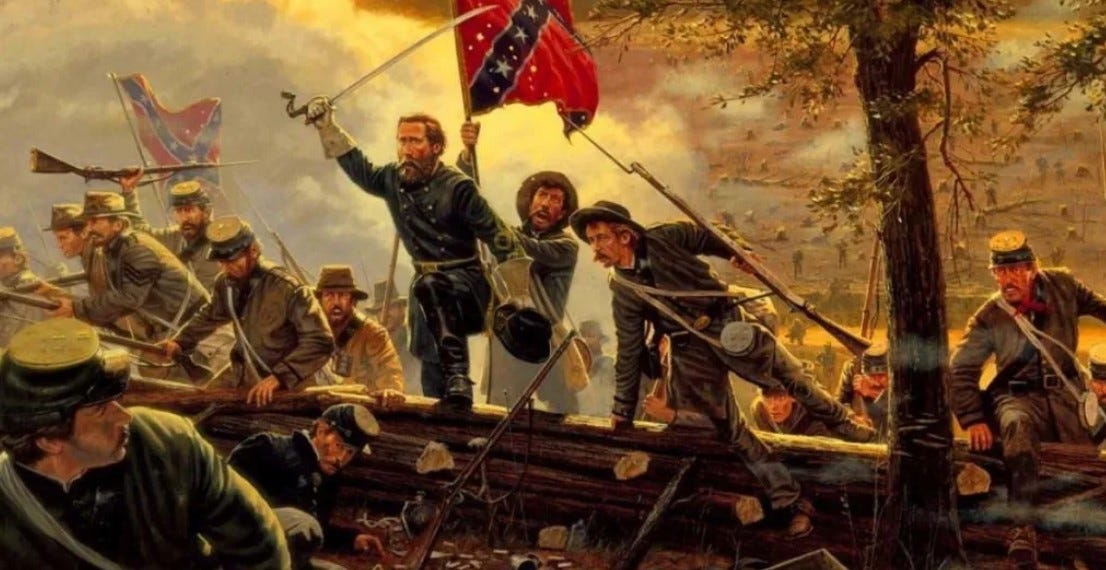The American Civil War (or their Second War for Independence) has been framed by the victors, and as such many important aspects have vanished from view. It is remarkably underappreciated just how strong was Southern support in Britain during the war. The British had an intuitive sense that the future of the aristocratic way of life was at stake, and not just in the South, but also at home. The outcome of the war proves that the British were justified in their concern. The following piece is based on Sheldon Vanauken’s excellent book, The Glittering Illusion (1954).
A practical matter
It is first good to realize that from the British point of view desiring Southern victory made all the sense in the world. The South was the major producer of cotton, which the British manufacturing industry depended on. The South was also eager to establish a free trade deal with Britain, which would have greatly bolstered the British economy and aligned with British economic policy.
The South was agrarian, not industrial, which made it a perfect match and partner with highly industrialized Britain. Like a match made in heaven. The United States, by contrast was already well industrialized and pursued a high tariff policy which damaged British financial interests.
Russian and German observers noted that rarely does such a sweet turn of fortune present itself to any Great Power. Britain stood to benefit immensely in the breakup of its great maritime competitor. In the best case scenario the Southern states might even join back in the empire, and in any case they would become a loyal and dependent ally to check the power of the United States, for example blocking them from any attempts of annexing Canada.
It was also a matter of consistency. British attitude and policy had been to support any nations fighting for their freedom and independence. This was the case with Italy, Poland, Greece, etc. To support the South in the same struggle was only to be considered part of established policy.
Deeper reasons
An emotional motive behind British support was the understanding that the men of the South were undiluted Anglo-Saxon stock, led by Virginians who were descendants of the first ever British colonists in the New World. The deepest and purest English roots were set in the South. The Northerners by contrast were considered a mongrel race of various European stocks. Southerners were kith and kin, harangued by an alien people.
Moreover, the Southerners were respectable and gentlemanly, the Northerners crude and vulgar – the archetypal Yankees. The Northern president Lincoln was widely considered a boor and a strongman despot, a nasty piece of work with not a genteel bone in him. As Vanauken puts it,
“To a good many thoughtful Englishmen, Abraham Lincoln, in reasserting a repudiated Government and a rejected brotherhood by the bayonet, was but walking in the grassless way of the despots of Austria and Russia.”
Compared to Lincoln, Jefferson Davis appeared the epitome of gentility.
When looked at more deeply, the American Civil War can be considered a retread of the English Civil War. Here too we have the romantic, genteel, aristocratic Cavaliers facing the utilitarian, fanatical Levelers. But this time it seemed like the aristocrats would win. They held possession of a large country with well defensible geography and bountiful resources. They had a large, high quality army with impeccable generals. They had the sympathies of both England and France behind them. They were deeply motivated to defend their homes and their way of life. There was passion behind their every move.
Then why did they lose? Because England did not come to help them. And because England didn’t come, France didn’t come either. The help of France allowed the 13 colonies to succeed in the First American War for Independence. The lack of help from England ensured failure in the Second.
Why did Britain remain inert? For two principal reasons. Firstly, the South was doing too well in the war. General Lee was too magnificent and his men too brave. It seemed like they could easily win it on their own, so there was no need for Britain to intervene. More fundamentally, the British believed that the democratic ideology of the North was simply self-negating.
The start of the Civil War in itself was proof that a large democracy could not hold together, and as such the built in societal dynamics would ensure Southern victory. A Great Man of History like Lee, combined with the eternal virtue residing in Aristocracy, could not but defeat moribund mass democracy which had already proven its weakness by ending up in this mess. Northern victory simply did not fit in the political philosophy and historical understanding dominant in Britain.
We may also say that the British had ‘got high on their own supply’. So intensely pro-South were the newspapers and the public discourse that people kept on believing in Southern victory no matter what the reality was on the ground. Here are quotations from The Times in the years 1964-65.
“The present prospects of the Confederates in the fourth year of the war are brighter than ever before. The failure of George III was not more complete. We have always said that the North could never subdue the South.”
“So long as that idol [the Union] stands on its pedestal the war must rage on, and we see no prospect of its early termination.”
In such an atmosphere the sudden defeat came as a horrible shock. Initially it meant emotional disappointment, but the deeper thinkers like Lord Acton already saw the fuller ramifications. Ever since the French Revolution the difficult relationship of freedom and equality had been tormenting our European civilization. The American Civil War was, thus far, the best and clearest exemplar of a war that was strictly fought between freedom and equality.
The South wanted freedom without equality. That is, freedom with an aristocracy and a slave economy. Like the ancient slave-holding Greeks who fought for freedom against Persia, or the slave-holding Founding Fathers who fought for freedom against Britain, the Southerners saw no contradiction.
The North fought for crude majority rule. One man one vote, with no distinction of quality. Because the Northern states were more populous, they would decide in the South’s behalf. They had decided that the South would get transformed, either by submitting to Democracy, or by being defeated in war. Submit they would not, defeated they were. It is ironic how the defenders of so called Liberal Democracy (ostensibly defined as a form of democracy that protects the rights of minorities) have always scorned the South and seen no issue in how the minority of millions that the South represented got crushed by the mass power of the Northern majority.
In Britain the ruling class were already tired and weary about any further Reforms towards democracy. In the 1832 Reform Act the power of the British upper class had been weakened, and the middle class had become more dominant – though the upper class still tended to rule. By 1860 there was already some pressure emerging for further reforms, for ones towards full enfranchisement and giving power to the masses.
Marx and Engels were both yearning for Northern victory (or rather expecting it, based on their Historical Materialism). They saw it as America moving to the revolutionary phase of its existence: democracy precedes and entails socialism, after all. The defeat of the Great Men of the South was relished by the duo, although they were disappointed General Lee was not hanged by the neck until dead, like Marshal Keitel and General Jodl would be some 70 years later, after a defeat tragically similar in its character and consequences.
The British aristocracy wanted to say no to the pressure for reform. A Southern victory would have vindicated the aristocrats and conclusively proved that increasing democracy could only lead to destabilization and disintegration, and aristocracy is not just the way of the past, but also the way of the future. But it was not to be. Instead, the end result pushed Britain onto the path of Mass Democracy. It is difficult to imagine the Reform Bills of 1867 and 1886 in a context where the proudly aristocratic South won its independence with British support.
Was it about slavery?
The key reason that prevented the support of the South from being universal in Britain was the issue of slavery. In the earlier decades of the 19th century Britain had spent a great deal treasure and effort in eradicating slavery. Supporting the emphatically slave-holding party in a war would seem contradictory, no?
On paper yes, but the situation is more complex than that. First of all, after seeing what happened to the Caribbean colonies after the slaves there were freed, the British had grown disillusioned. After being emancipated, the blacks had become indolent and antisocial. The societies shriveled, businesses went under, investments crashed, and local economies collapsed, all because the black man of the Caribbean would not work for a living nor act civilly without the direction of his former master.
Hence, the British could not blame the Southerners for doubting the supposed virtue of emancipation – certainly not immediate or uncontrolled emancipation. Many Brits had also visited Southern plantations and knew they tended to be quite pleasant places with a real sense of community, and suspected many of the British “wage slaves” would eagerly switch places with some chattel slave of the South.
Despite the propaganda, the British also knew that the Civil War was not actually about ending slavery. Abraham Lincoln had made it clear in his inaugural address that he had no desire or intention to end slavery. Then what about the emancipation proclamation in 1863? The British regarded it as a cynical ploy, an underhanded move by the Northern President who was losing battles. The obvious goal was to use the proclamation to incite a servile revolt in the south, particularly against the southern wives, daughters and sisters who were in charge of the plantations while their husbands were away at war.
Making this cynical account difficult to doubt, Lincoln did not emancipate the slaves in Northern states. To the British it was clear that what had motivated the North into the war was their anti-aristocratic political ideology, not any genuinely held anti-slavery principle. Thus, it was also effortless for the pro-aristocratic Brits to oppose the Northerners in their attempt at societal leveling.
The Long Defeat
Marx and Engels were not unique in their support for the Northern cause. All over Britain it was the atheists, the radicals and the malcontents who were most eager in wishing for Southern defeat. The Southern clergy saw clearly that there were more than merely human forces at play. During the war, the priests of the Confederacy appealed to the Christians of the world. In the following is quoted Reverend Benjamin Morgan Palmer’s Thanksgiving address from 1860:
"The abolition spirit is undeniably atheistic. The demon which erected its throne upon the guillotine in the days of Robespierre has found its way across the ocean, and with its torch of discord and its dagger of assassination, seeks to light up the fires of civil war in this fair land.
It denies the Bible, mocks at marriage, and profanes the very name of God. Against this spirit, and all its multiform manifestations, the South is now breasting herself in this contest…. We defend the cause of God and religion when we defend the South.
Need I pause to show how this institution of slavery is interwoven with our whole social fabric—how it is sanctioned by the Scriptures, illustrated by the lives of the patriarchs, and regulated by the legislation of Moses? Need I remind you that this is no question of expediency, but one of principle, rooted in the conscience and the Word of God? If we yield here, we yield everything; and the banner of the Cross will fall from our hands into the dust, to be trampled under the feet of an infidel and revolutionary foe."
The struggle of the South echoes struggles previous and struggles still to come. As mentioned, the English Civil War was a prefigurement of the same conflict. The above quoted Reverend Palmer found connections with the French Revolution’s anti hierarchical zeal.
The gleeful reaction of Marx was a portent of things to come in the 20th century – of the Fall of the Eagles in the First World War, with the destruction of the three great Christian emperors and the ensuing rise of republicanism and socialism. Also of the Second World War, arising as a reaction to the dysfunction resulting from the outcome of the First. At last, in 1945 Marx and Engels got what they had desired: the vanquished generals of the reactionary, anti-egalitarian enemy were hanged like common criminals after a show trial. Eerily similar were the “reconstruction” of the South and the “denazification” of Germany.
Time and again the forces of hierarchy and essentialism have had to fight losing battles against the powers of equality and relativism. J. R. R. Tolkien described his Christian understanding of history as one Long Defeat. There is reason to be convinced the American Civil War counts as a key example of what the Professor had in mind.







This was a very good article, but as a Yankee I don’t like the idea of the Continent beinf divided up and used by foreign powers. While I am a localist, I’m not a secessionist. America or any smart nation realizes they can’t be divided at home or else they look weak on the world stage. I understand that Lincoln’s presidency was the first death knell for localism and States’s Rights but I also believe in a strong and United America on the world stage.